Music Reissues Weekly: Chelsea - The Step-Forward Years | reviews, news & interviews
Music Reissues Weekly: Chelsea - The Step-Forward Years
Music Reissues Weekly: Chelsea - The Step-Forward Years
How Gene October’s perennial vehicle was fundamental to the birth of British punk rock
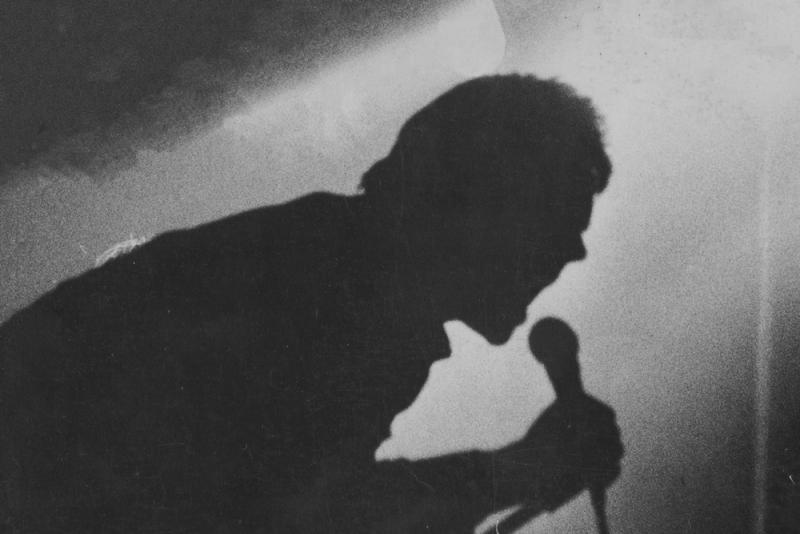
On 21 June 1977, listeners to John Peel’s radio show heard a song titled “Pretty Vacant.” It wasn’t a preview of the forthcoming Sex Pistols single of the same name, which would be in shops on 2 July, but a different song. The band lifting the title was Chelsea, a UK punk outfit whose first single, “Right to Work,” had been released on 3 June.
It was bizarre. Punk fans and scene insiders alike knew “Pretty Vacant” was a Sex Pistols staple. Demos of the song were in circulation before the single was out, as were live recordings. Chelsea’s selection of the title was equivalent to a psych-era band hearing about “Strawberry Fields Forever” just before its release and gazumping The Beatles by co-opting the title. Or, more recently pilfering, say, “Bohemian Rhapsody.”
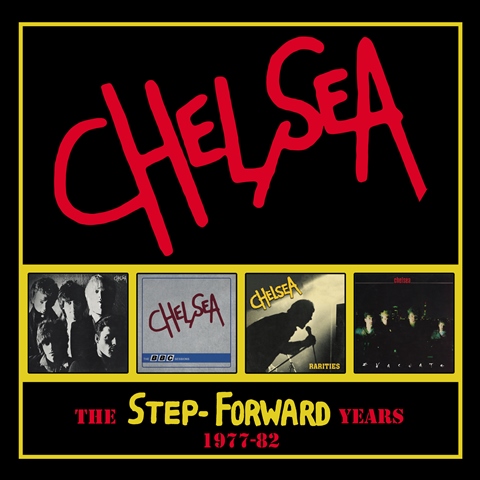 At least Chelsea did not release their “Pretty Vacant.” If they had, the reaction would have been scornful. It remained a one-off recording for the Peel session. Now, their “Pretty Vacant” is heard on the four-CD clamshell set The Step Forward Years 1977-1982. And, regardless of its eccentric title, this particular “Pretty Vacant” is a top-notch, three-minute example of 1977 Brit-punk at its most reductive. “I’m pretty vacant, yeah, yes I am” is the main vocal refrain.
At least Chelsea did not release their “Pretty Vacant.” If they had, the reaction would have been scornful. It remained a one-off recording for the Peel session. Now, their “Pretty Vacant” is heard on the four-CD clamshell set The Step Forward Years 1977-1982. And, regardless of its eccentric title, this particular “Pretty Vacant” is a top-notch, three-minute example of 1977 Brit-punk at its most reductive. “I’m pretty vacant, yeah, yes I am” is the main vocal refrain.
The “Pretty Vacant” episode is typical of the missteps, stop-start progress and general disorderliness integral to Chelsea. The band was – and remains – the vehicle of the man born John O’Hara, better known as Gene October. He and they were there at the creation of British punk; fundamental to it. Yet he and they never achieved a powerful lift-off. Nonetheless, The Step Forward Years collects 87 tracks from records and radio sessions plus demos and a couple of live shows. More than enough to get to grips with what Chelsea were up to musically once they began recording.
In 1977, despite line-up changes, there were two terrific singles, “Right to Work” and “High Rise Living.” The next year and into 1980 saw greater stability, four singles and, in 1979, a debut album. This phase was exceedingly Clash-like in a Give ‘em Enough Rope way, produced some wonderful singles and the patchy but mostly great album. After this, another split in 1980, and October’s invention of a new Chelsea: five singles, an album, all by-rote readings of punk sonic tropes which leave little impression. This is the core of The Step Forward Years, around which are hung demos, live material and radio sessions. Nothing here is previously unissued. What’s overlooked by his straightforwardly presented and modestly annotated package – it’s just about the music collected, eschewing context – is a sense of Chelsea’s underlying significance. Irrespective of the merits of much of 1977 to 1980’s music, this was more than just another Brit-punk band. It all revolves around the man who became Gene October.
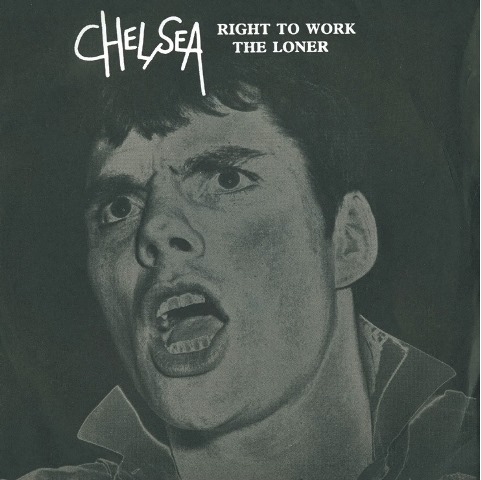 John O’Hara was connected to Acme Attractions, a clothes stall in the King’s Road’s Antiquarius antiques market. He had been in porn films and mags, and was an extra in the films Aces High and The Omen. Acme was run by John Krivine and Steph Raynor. Jeanette Lee and Don Letts worked there. In time, it turned into the shop Boy. Acme complemented and counterparted Malcolm McLaren and Vivienne Westwood’s Sex/Seditionaries shop, further west down King’s Road. As well as Acme, Antiquarius also had a stall run by Marion Elliot, the future Poly Styrene. O’Hara knew exactly what was evolving along the King’s Road.
John O’Hara was connected to Acme Attractions, a clothes stall in the King’s Road’s Antiquarius antiques market. He had been in porn films and mags, and was an extra in the films Aces High and The Omen. Acme was run by John Krivine and Steph Raynor. Jeanette Lee and Don Letts worked there. In time, it turned into the shop Boy. Acme complemented and counterparted Malcolm McLaren and Vivienne Westwood’s Sex/Seditionaries shop, further west down King’s Road. As well as Acme, Antiquarius also had a stall run by Marion Elliot, the future Poly Styrene. O’Hara knew exactly what was evolving along the King’s Road.
Chelsea were formed under Krivine’s management. Arriving via a music paper ad, the first bassist was Tony James, a friend of The Clash’s Mick Jones; both had been in the late 1975/early 1976 rehearsal-only band London SS. Billy Broad, late of the Brighton band The Rockettes, was the new group’s guitarist. He was one of the group of Sex Pistols followers dubbed “the Bromley contingent” by writer Caroline Coon. Broad had tried to interest McLaren in The Rockettes. The drummer was John Towe. This band was embedded in the burgeoning punk scene.
Their first live show was at the ICA on 18 October 1976 but as LSD rather than Chelsea, on a bill with the Krivine-associated Throbbing Gristle. Their set mixed chestnuts like “Around and Around,” “For Your Love,” “Gloria,” “Route 66,” “Rebel Rebel” and mid-Sixties Stones’ songs with two originals, “Cathy McGowan” and “Walking in the City.” After picking up Andrew Czezowski as their next manager – he did the books for Acme Attractions and the McLaren/Westwood shop – they supported The Stranglers as Chelsea at The Nashville Rooms on 21 November 1976. Their set finished with Gene October, as O’Hara was by this point, stranded at the side of the stage while guitarist Billy Idol, as Broad had become, sang “From the Heart.” That was it for this version of Chelsea. Gene October had been elbowed aside. On stage, by his own band.
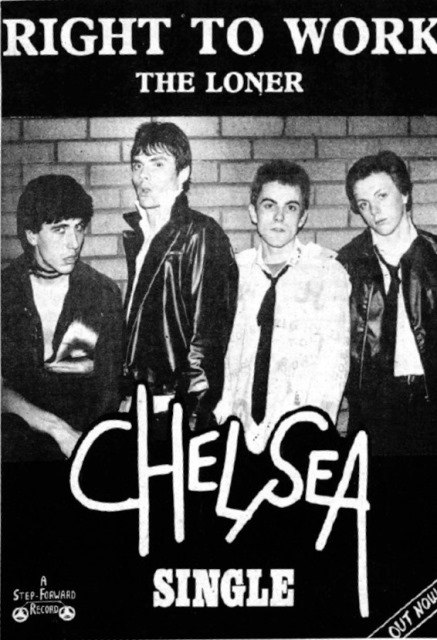 Idol, James and Towe swiftly found guitarist Bob Andrews and played their first show as Generation X on 14 December at the new, punk-only Covent Garden club The Roxy. “Cathy McGowan” was now “Ready Steady Go.” Run by Czezowski and his partner Susan Carrington, The Roxy used a venue which October had found – he told Czezowski about what was then called Chaguramas. Once again, October had been side-lined. He was left with no band. What happened to Generation X is a matter of punk history.
Idol, James and Towe swiftly found guitarist Bob Andrews and played their first show as Generation X on 14 December at the new, punk-only Covent Garden club The Roxy. “Cathy McGowan” was now “Ready Steady Go.” Run by Czezowski and his partner Susan Carrington, The Roxy used a venue which October had found – he told Czezowski about what was then called Chaguramas. Once again, October had been side-lined. He was left with no band. What happened to Generation X is a matter of punk history.
October picked himself up. He assembled Carey Fortune (drums, a former Stranglers roadie), Bob Jessie (bass) and Martin Stacey (guitar). They debuted at The Roxy, as support to The Clash on 1 January 1977. Czezowski booked them as “The O’Haras,” after October’s real name. Their fee was £15 and a round of drinks. The Clash got £100 or 50% of the door, whichever was more. By the time they took the stage “The O’Haras” had become the next iteration of Chelsea. Their subsequent shows were at the Hope and Anchor and, despite no longer having Czezowski as their manager, The Roxy.
It seemed to be going OK. In March, October said Chelsea were releasing a single titled “Curfew” on Track Records, the label run by The Who’s management. It never happened. Siouxsie and the Banshees also had a brush with Track, and went as far as recording some demos for the label. The punk band which did end up with Track were transplanted New Yorkers The Heartbreakers, whose first single was issued in May. With no single out, Chelsea had hit another bump in the road.
This was compounded by carping in the music press about October. In February, the weekly paper National Rock Star said Chelsea’s front man “insists he’s only 22 years old, though it’s obvious he’s older. A few of the other new wavers say he’s a poseur, only involved in punk rock because it’s fashionable…he used to be a male model and actor, and being vocalist of Chelsea is just another part to him.”
 Role playing or not, the brisk, impactful “Right to Work” single was released in early June. It was on Step-Forward, the independent label run by Sniffin’ Glue’s Mark Perry under the watchful eye of the business-minded Miles Copeland. By the time it was out though, Chelsea had once again fallen apart. The Fortune, Jessie and Stacey band recorded the single, but its misleading sleeve pictured the next Chelsea: October, Fortune, Henry Badwoski (aka Henry Daze, bass) and James Stevenson (guitar). It was this line-up (pictured in the ad seen above right) which recorded the Peel session with “Pretty Vacant.” Chelsea had survived yet another smash-up.
Role playing or not, the brisk, impactful “Right to Work” single was released in early June. It was on Step-Forward, the independent label run by Sniffin’ Glue’s Mark Perry under the watchful eye of the business-minded Miles Copeland. By the time it was out though, Chelsea had once again fallen apart. The Fortune, Jessie and Stacey band recorded the single, but its misleading sleeve pictured the next Chelsea: October, Fortune, Henry Badwoski (aka Henry Daze, bass) and James Stevenson (guitar). It was this line-up (pictured in the ad seen above right) which recorded the Peel session with “Pretty Vacant.” Chelsea had survived yet another smash-up.
After this, Badwoski was off and a couple more bass players came and went – one of whom was the superbly named Simon Vitesse. There was an appearance in Derek Jarman’s film Jubilee (the version of “Right to Work” recorded for the soundtrack album is not included on The Step Forward Years – for completeness, it could have been licensed). Then, outlandish as it is, Badwoski returned. October declared that a 6 October show at The Roxy, no longer to do with Czezowski, would be their last – Chelsea’s farewell show. Gene October was abandoning punk to form a powerpop band called Love and Kisses. Chelsea’s legacy was one single, one Peel session and having been the hothouse for the now on-the-rise Generation X. That was it.
Of course, it wasn’t.
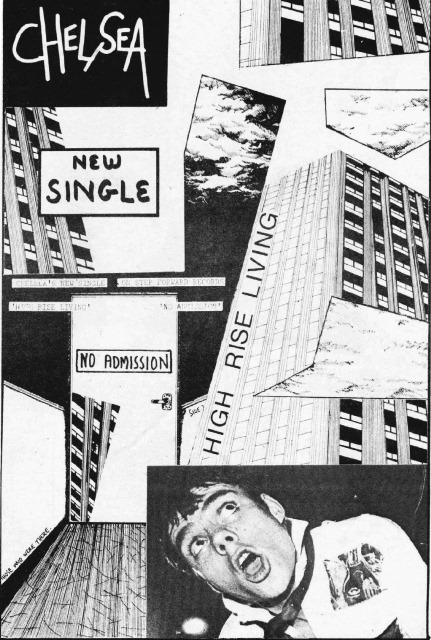 A new, absolutely punk Chelsea played their first show at the Marquee on 21 December 1977. Powerpop was out the window. A week earlier, Step-Forward released Chelsea’s second single, “High Rise Living.” Typically, it was not recorded by the band which could now be seen on stage but had been completed by the October, Badowski, Fortune, Stevenson line-up. Presumably, with the farewell looming, “High Rise Living” had never - at least initially - been intended for release.
A new, absolutely punk Chelsea played their first show at the Marquee on 21 December 1977. Powerpop was out the window. A week earlier, Step-Forward released Chelsea’s second single, “High Rise Living.” Typically, it was not recorded by the band which could now be seen on stage but had been completed by the October, Badowski, Fortune, Stevenson line-up. Presumably, with the farewell looming, “High Rise Living” had never - at least initially - been intended for release.
After this, with October and his new members including stalwart guitarist James Stevenson, a general level of stability into 1980 when there were yet more splits and October’s construction of an entirely new Chelsea which played its first show on 8 January 1981 at the Soho club Gossips.
The twists, turns and surprising longevity of the Gene October-fronted band which was always called Chelsea render it tricky to weed-out what’s significant about this particular aspect of British punk rock’s history. As does, in this case, the sheer volume of what’s collected on The Step Forward Years 1977-1982. Allied with all this, as records continued to be issued the earlier gems were buried beneath an ever-increasing pile of not-so-good stuff. Also buried was Chelsea’s role in the early days of what was fermenting along the King’s Road.
This box set falls short of telling the full story but, if due diligence is exercised, it’s implicitly a piece of the jig-saw making the case that Chelsea and Gene October were vital to developing what became British punk.
- Next week: before punk, there was pub rock – the Brinsley Schwarz box set Thinking Back: The Anthology
- More reissue reviews on theartsdesk
- Kieron Tyler’s website
Explore topics
Share this article
The future of Arts Journalism
You can stop theartsdesk.com closing!
We urgently need financing to survive. Our fundraising drive has thus far raised £49,000 but we need to reach £100,000 or we will be forced to close. Please contribute here: https://gofund.me/c3f6033d
And if you can forward this information to anyone who might assist, we’d be grateful.

Subscribe to theartsdesk.com
Thank you for continuing to read our work on theartsdesk.com. For unlimited access to every article in its entirety, including our archive of more than 15,000 pieces, we're asking for £5 per month or £40 per year. We feel it's a very good deal, and hope you do too.
To take a subscription now simply click here.
And if you're looking for that extra gift for a friend or family member, why not treat them to a theartsdesk.com gift subscription?
more New music
 Solar Eyes, Hare & Hounds, Birmingham review - local lads lay down some new tunes for a home crowd
Psychedelic indie dance music marinated in swirling dry ice
Solar Eyes, Hare & Hounds, Birmingham review - local lads lay down some new tunes for a home crowd
Psychedelic indie dance music marinated in swirling dry ice
 The Lemonheads' 'Love Chant' is a fine return to form
Evan Dando finally gets back in the saddle with an album of new tunes
The Lemonheads' 'Love Chant' is a fine return to form
Evan Dando finally gets back in the saddle with an album of new tunes
 Music Reissues Weekly: Evie Sands - I Can’t Let Go
Diligent, treasure-packed tribute to one of Sixties’ America’s great vocal stylists
Music Reissues Weekly: Evie Sands - I Can’t Let Go
Diligent, treasure-packed tribute to one of Sixties’ America’s great vocal stylists
 'Deadbeat': Tame Impala's downbeat rave-inspired latest
Fifth album from Australian project grooves but falls flat
'Deadbeat': Tame Impala's downbeat rave-inspired latest
Fifth album from Australian project grooves but falls flat
 Heartbreak and soaring beauty on Chrissie Hynde & Pals' Duets Special
The great Pretender at her most romantic and on the form of her life
Heartbreak and soaring beauty on Chrissie Hynde & Pals' Duets Special
The great Pretender at her most romantic and on the form of her life
 The Last Dinner Party's 'From the Pyre' is as enjoyable as it is over-the-top
Musically sophisticated five-piece ramp up the excesses but remain contagiously pop
The Last Dinner Party's 'From the Pyre' is as enjoyable as it is over-the-top
Musically sophisticated five-piece ramp up the excesses but remain contagiously pop
 Moroccan Gnawa comes to Manhattan with 'Saha Gnawa'
Trance and tradition meet Afrofuturism in Manhattan
Moroccan Gnawa comes to Manhattan with 'Saha Gnawa'
Trance and tradition meet Afrofuturism in Manhattan
 Soulwax’s 'All Systems Are Lying' lays down some tasty yet gritty electro-pop
Belgian dancefloor veterans return to the fray with a dark, pop-orientated sound
Soulwax’s 'All Systems Are Lying' lays down some tasty yet gritty electro-pop
Belgian dancefloor veterans return to the fray with a dark, pop-orientated sound
 Music Reissues Weekly: Marc and the Mambas - Three Black Nights Of Little Black Bites
When Marc Almond took time out from Soft Cell
Music Reissues Weekly: Marc and the Mambas - Three Black Nights Of Little Black Bites
When Marc Almond took time out from Soft Cell
 Album: Mobb Deep - Infinite
A solid tribute to a legendary history
Album: Mobb Deep - Infinite
A solid tribute to a legendary history
 Album: Boz Scaggs - Detour
Smooth and soulful standards from an old pro
Album: Boz Scaggs - Detour
Smooth and soulful standards from an old pro
 Emily A. Sprague realises a Japanese dream on 'Cloud Time'
A set of live improvisations that drift in and out of real beauty
Emily A. Sprague realises a Japanese dream on 'Cloud Time'
A set of live improvisations that drift in and out of real beauty

Add comment